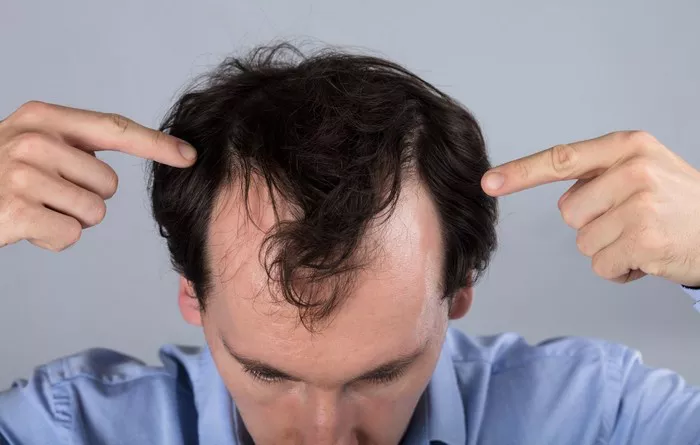Hair loss can be a concerning and unexpected issue, especially for young males. At the age of 18, individuals often experience various changes in their bodies, and hair loss can be one of them. In this comprehensive guide, we’ll explore the factors that contribute to hair loss in 18-year-old males and offer insights into understanding and addressing this common concern.
The Dynamics of Hormones: A Key Player in Hair Loss
At the age of 18, hormonal fluctuations are a natural part of adolescence and young adulthood. Androgens, particularly dihydrotestosterone (DHT), play a significant role in the development of male characteristics, including facial hair, deepening of the voice, and the onset of male pattern baldness. Excessive levels of DHT can lead to the miniaturization of hair follicles, causing them to produce thinner and shorter hair until they eventually stop producing hair altogether.
Understanding the interplay between hormones and genetics is crucial in comprehending why some 18-year-old males may experience hair loss while others do not.
Genetic Predisposition: The Influence of Family History
One of the primary reasons for hair loss in 18-year-old males is often a genetic predisposition to male pattern baldness (androgenetic alopecia). If there is a family history of baldness, especially on the maternal or paternal side, the likelihood of experiencing hair loss at a young age increases.
Male pattern baldness typically begins with a receding hairline or thinning at the crown, and its onset can be influenced by genetic factors inherited from both parents. Understanding the role of genetics can help individuals make informed decisions about potential treatments and interventions.
Nutritional Deficiencies: Fueling Healthy Hair Growth
A balanced and nutritious diet is essential for overall health, including the health of hair follicles. At 18, individuals may not always prioritize a well-rounded diet, leading to potential nutritional deficiencies that can contribute to hair loss.
Vitamins and minerals such as vitamin D, iron, zinc, and biotin are crucial for promoting healthy hair growth. A deficiency in these nutrients can lead to weakened hair follicles and increased shedding. Exploring dietary adjustments and, if necessary, incorporating supplements under the guidance of a healthcare professional can address nutritional deficiencies and support healthier hair.
Stress and Lifestyle Factors: Impact on Hair Health
The pressures of academic life, social expectations, and other stressors unique to young adulthood can contribute to hair loss. Chronic stress may disrupt the normal hair growth cycle, leading to increased shedding and thinning.
Moreover, lifestyle choices, such as inadequate sleep, smoking, and excessive alcohol consumption, can negatively impact overall health, including the health of hair. Adopting stress-management techniques, maintaining a healthy sleep routine, and making positive lifestyle choices can have a positive impact on both mental well-being and hair health.
Hairstyling Practices: Avoiding Damage
Frequent use of styling tools, such as straighteners and blow dryers, and tight hairstyles like ponytails and braids can exert stress on the hair shaft and follicles. Over time, this mechanical stress can lead to hair breakage and, in some cases, contribute to hair loss.
Opting for gentler hairstyling practices, allowing the hair to air-dry, and avoiding tight hairstyles that pull on the hair can help minimize the risk of damage and promote healthier hair growth.
Medical Conditions: Identifying Underlying Issues
Certain medical conditions, such as thyroid disorders, autoimmune diseases, and hormonal imbalances beyond normal fluctuations, can contribute to hair loss. If an 18-year-old male is experiencing significant hair loss, consulting with a healthcare professional is crucial to rule out underlying medical conditions that may be contributing to the issue.
In some cases, treating the underlying medical condition can help address hair loss. Seeking timely medical advice ensures a comprehensive evaluation and appropriate management.
Treatment Options and Prevention Strategies: Taking Action
For individuals concerned about hair loss at the age of 18, various topical treatments and medications may be considered. Minoxidil, for example, is an over-the-counter topical solution that has been shown to promote hair regrowth in some individuals. Finasteride, a prescription medication, can help inhibit the action of DHT, addressing the root cause of male pattern baldness.
It’s essential to note that the effectiveness of these treatments can vary, and consulting with a healthcare professional is advisable to determine the most suitable course of action.
Lifestyle Modifications and Self-Care
Adopting a holistic approach to hair health involves incorporating lifestyle modifications and self-care practices. This includes maintaining a balanced diet rich in essential nutrients, managing stress through techniques like meditation and exercise, and avoiding harmful hairstyling practices.
Regular scalp massages, promoting good hygiene, and protecting the hair from excessive sun exposure can contribute to a healthy scalp environment, supporting optimal hair growth.
Consulting a Healthcare Professional: Seeking Expert Advice
For individuals grappling with hair loss at the age of 18, seeking advice from a healthcare professional or a dermatologist specializing in hair disorders is essential. A thorough evaluation can help identify the specific factors contributing to hair loss and guide the development of an effective treatment plan.
Healthcare professionals can offer personalized recommendations, considering individual health history, genetic factors, and lifestyle choices. Early intervention and proactive management often yield the best outcomes in addressing hair loss concerns.
See Also: Preserving Your Locks: A Guide to Hair Loss Prevention After 40
Conclusion: Navigating the Journey to Healthy Hair
In conclusion, understanding why hair loss occurs in 18-year-old males involves a nuanced exploration of genetic factors, hormonal influences, lifestyle choices, and potential underlying medical conditions. While hair loss can be disconcerting, it’s essential to approach the issue with a comprehensive perspective that encompasses both prevention strategies and treatment options.
By adopting a proactive approach, seeking professional guidance, and making informed lifestyle choices, individuals can navigate the journey to healthier hair and overall well-being. Remember, addressing hair loss is a personalized process, and there are effective strategies available to support individuals in their quest for optimal hair health at the age of 18 and beyond.


